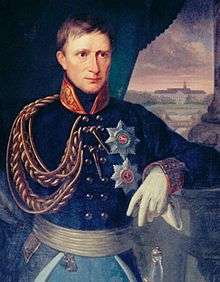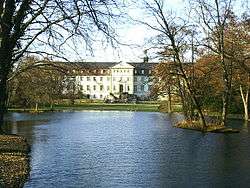Friedrich von der Decken


Graf[1] Johann Friedrich von der Decken (25 May 1769 – 22 May 1840) was a Hanoverian general and diplomat during the Napoleonic Wars.
Life
The von der Deckens are an old noble family in Lower Saxony which produced several officers for the forces of the Electorate of Hanover. In 1784 Johann Friedrich joined the army, fighting in the French Revolutionary Wars from 1793 to 1795. He headed a military journal with his friend Gerhard von Scharnhorst, the Prussian military reformer for many years. In 1803 he joined the diplomatic service on Napoleon's occupation of Hanover and left for the United Kingdom. On 28 July 1803 he began together with Sir Colin Halkett recruiting expatriate Hanoverian soldiers to fight for the United Kingdom in the War of the Third Coalition and subsequent Napoleonic conflicts, with his recruits forming the King's German Legion, with which he fought from 1805 to 1807.[2]
In 1808 he was sent to Spain and Portugal during the Peninsular War as a diplomat and military advisor and to recruit troops to fight against France, before returning to England, where in 1815 he organised another Hanoverian regiment to fight against the French during the Hundred Days. After the war he refused military decorations from the Netherlands and Prussia. In 1817 he bought the former Benedictine monastery in Ringelheim and rebuilt it as his country house, the Schloss und Park Ringelheim, spending his retirement there from 1833, the year in which he was made a count (Graf). It is a primogeniture title and it was given by William IV as king of the restored kingdom of Hanover. In 1835 he also became president of the Historical Society for Lower Saxony.
Bibliography
- Richard W Fox: Conservative accommodation to revolution : Friedrich von der Decken and the Hanoverian military reform, 1789-1820 : an inquiry into the role of the military in state and society - Thesis (PhD) - Yale University, 1972
- (in German) Karl Ernst Hermann Krause: Decken, Johann Friedrich, Graf in the Allgemeine Deutsche Biographie (ADB). Vol 5, Duncker & Humblot, Leipzig 1877, p. 2.
References
- ↑ Regarding personal names: Graf was a title before 1919, but now is regarded as part of the surname. It is translated as Count. Before the August 1919 abolition of nobility as a legal class, titles preceded the full name when given (Graf Helmuth James von Moltke). Since 1919, these titles, along with any nobiliary prefix (von, zu, etc.), can be used, but are regarded as a dependent part of the surname, and thus come after any given names (Helmuth James Graf von Moltke). Titles and all dependent parts of surnames are ignored in alphabetical sorting. The feminine form is Gräfin.
- ↑ North Ludlow Beamish: History of the King's German Legion, 2 vols. London, 1834-7, Vol. 1 p. 80 Vol. 2
External links
- King's German Legion
- (in German) Literature by and about Friedrich von der Decken in the German National Library catalogue
- (in German) Texts by and on Friedrich von der Decken on German WikiSource
-

Wikimedia Commons has media related to Friedrich von der Decken.
| Wikimedia Commons has media related to King's German Legion. |